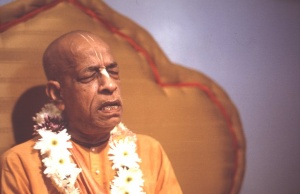CC Madhya 15.110

A.C. Bhaktivedanta Swami Prabhupada
TEXT 110
- ākṛṣṭiḥ kṛta-cetasāṁ su-manasām uccāṭanaṁ cāṁhasām
- ācaṇḍālam amūka-loka-sulabho vaśyaś ca mukti-śriyaḥ
- no dīkṣāṁ na ca sat-kriyāṁ na ca puraścaryāṁ manāg īkṣate
- mantro ’yaṁ rasanā-spṛg eva phalati śrī-kṛṣṇa-nāmātmakaḥ
SYNONYMS
ākṛṣṭiḥ—attraction; kṛta-cetasām—of saintly persons; su-manasām—of the most liberal-minded; uccāṭanam—annihilator; ca—also; aṁhasām—of sinful reactions; ā-caṇḍālam—even to the caṇḍālas; amūka—except the dumb; loka-su-labhaḥ—very easy to achieve for all persons; vaśyaḥ—full controller; ca—and; mukti-śriyaḥ—of the opulence of liberation; na u—not; dīkṣām—initiation; na—not; ca—also; sat-kriyām—pious activities; na—not; ca—also; puraścaryām—regulative principles before initiation; manāk—slightly; īkṣate—depends upon; mantraḥ—mantra; ayam—this; rasanā—tongue; spṛk—touching; eva—simply; phalati—is fruitful; śrī-kṛṣṇa-nāma-ātmakaḥ—consisting of the holy name of Lord Kṛṣṇa.
TRANSLATION
“‘The holy name of Lord Kṛṣṇa is an attractive feature for many saintly, liberal people. It is the annihilator of all sinful reactions and is so powerful that, save for the dumb who cannot chant it, it is readily available to everyone, including the lowest type of man, the caṇḍāla. The holy name of Kṛṣṇa is the controller of the opulence of liberation, and it is identical with Kṛṣṇa. When a person simply chants the holy name with his tongue, immediate effects are produced. Chanting the holy name does not depend on initiation, pious activities or the puraścaryā regulative principles generally observed before initiation. The holy name does not wait for any of these activities. It is self-sufficient.’”
PURPORT
This verse is found in the Padyāvalī (29), an anthology of verses compiled by Śrīla Rūpa Gosvāmī.